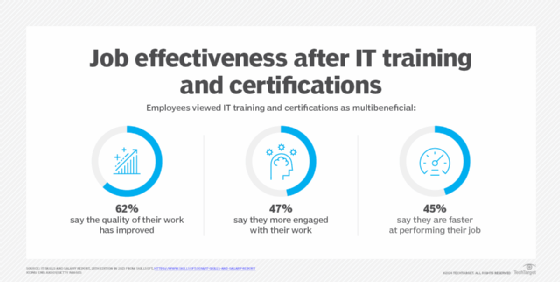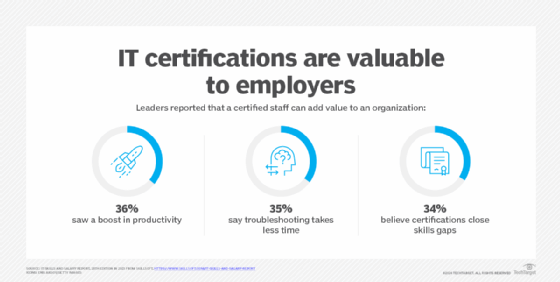
Getty Images
Upskill your cloud team for success
An investment in people is an investment in the company. See how a trained and upskilled staff can have a positive impact on productivity and profits.
The IT landscape is changing at an incredible rate. Software vendors and customers are forcing companies to keep up or become outdated. The question becomes: Is your cloud staff keeping up?
Years ago, it was common to send staff to a trade show or one-week vendor course for annual training. However, that line of thinking has become outdated as customers embrace multi-cloud environments, AI and machine learning. Now, enterprises need to invest in their cloud teams and provide proper training to align them for success.
Training is an investment
All this new technology introduces an uncomfortable truth: Your staff is not going to simply learn on the job. Organizations need to provide staff with the budget and time to learn. Some of these technologies aren't only an evolution of legacy tech but a revolution in what it is and what it can do for your company.
A traditional argument against training is that staff will take provided training and get a new job. This isn't a concern if IT staff is compensated fairly, however. It is now common knowledge that training provides better employee retention and morale. An investment in people is an investment in the company.

Keep in mind, an entry-level help desk person can become a cloud admin in a short amount of time. That level of internal growth helps foster staff development and showcase the company's investment in its employees. Training efforts aren't always easy, but companies must realize it has a positive effect on both staff and the bottom line.
Training should not be employee-driven. Management should own training initiatives and receive input from staff. If staff tries to drive training requests, but management says no due to cost or time, morale can decline. But if management provides the budget and time from the beginning, employees see that the company wants to foster staff growth. In any training budget, consider paying for study materials and certification exams. While training has upfront costs, it results in direct savings to the company's bottom line.

Training can turn into profit
An investment in IT personnel can bring substantial change to an organization, not just in new technologies. For example, say a company trains its personnel in multi-cloud strategies. That staff could eventually adjust the company's cloud footprint to save a certain amount of money a month, which results in direct monthly operational savings.
While IT is often associated with capital spending, companies also have to look at operational savings with these new technologies as well. Consider machine learning and AI. These technologies aren't just for large-scale companies -- they're for everyone, and their use cases continue to expand. IT employees who aren't knowledgeable in these fields will be catching up to customers and internal groups who already use them without guidance. This feeds rogue IT efforts and employee resistance when IT teams try to respond.
IT staff might have some knowledge silos, but it's important to have some level of cross knowledge of new topics. Everyone should be properly trained in security, not just the dedicated security team. Security has to be everyone's focus, but it's also a balance of adequate security and customer experience.
Your staff knows the company best
When dealing with new technologies, hiring new staff isn't always necessary. Enterprises benefit when their employees are excited to work with a new technology and get engaged with what it can do. While enterprises might consider hiring externally, outside consultants are just observers.
Your staff knows how to apply this new technology and how to move the company to the next level. They're in the best position to make ideal outcomes for the business.
Brian Kirsch, an IT architect and Milwaukee Area Technical College instructor, has been in IT for more than 20 years, holds multiple certifications and sits on the VMUG board of directors.








